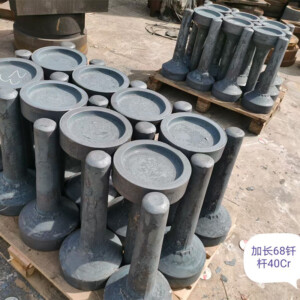The process of free forging is an essential technique in the manufacturing of alloy steel components. It involves shaping the metal by applying compressive forces without the use of dies. This method is particularly advantageous for producing large and complex shapes that require high strength and durability. The free forging temperature range for alloy steel is a critical factor that determines the quality and characteristics of the final product. Maintaining the correct temperature ensures optimal material properties, such as toughness, ductility, and resistance to wear and fatigue.
Alloy steel is a type of steel that is alloyed with various elements to enhance its mechanical properties. Common alloying elements include chromium, nickel, molybdenum, and vanadium. These elements contribute to the steel’s ability to withstand extreme conditions and improve its overall performance. The free forging temperature range for alloy steel varies depending on the specific composition of the alloy. Generally, it ranges from 900°C to 1200°C, but precise control is necessary to avoid defects such as cracking or excessive grain growth.

Understanding the importance of temperature control in free forging is crucial for manufacturers. The free forging temperature range for alloy steel must be carefully monitored to achieve the desired microstructure and mechanical properties. At temperatures below the optimal range, the steel may become too hard and brittle, leading to potential failures in service. Conversely, temperatures above the range can cause excessive grain growth, reducing the material’s strength and toughness. Therefore, precise temperature management is essential for producing high-quality alloy steel components.
Yantai Haoyi (Shengteng) Forging Co., Ltd.우리의 핵심 팀은 2012 년부터 위조 산업을 전문으로하고 있습니다.2018 년에는 국제 무역 기능을 향상시키기 위해 상당한 업그레이드를 받았으며, 고품질의 단조 제품 및 가공 서비스를 전 세계 고객에게 제공하는 데 전념했습니다.
Copyright © 2025 Yantai Haoyi (Shengteng) Forging Co., Ltd 판권 소유.